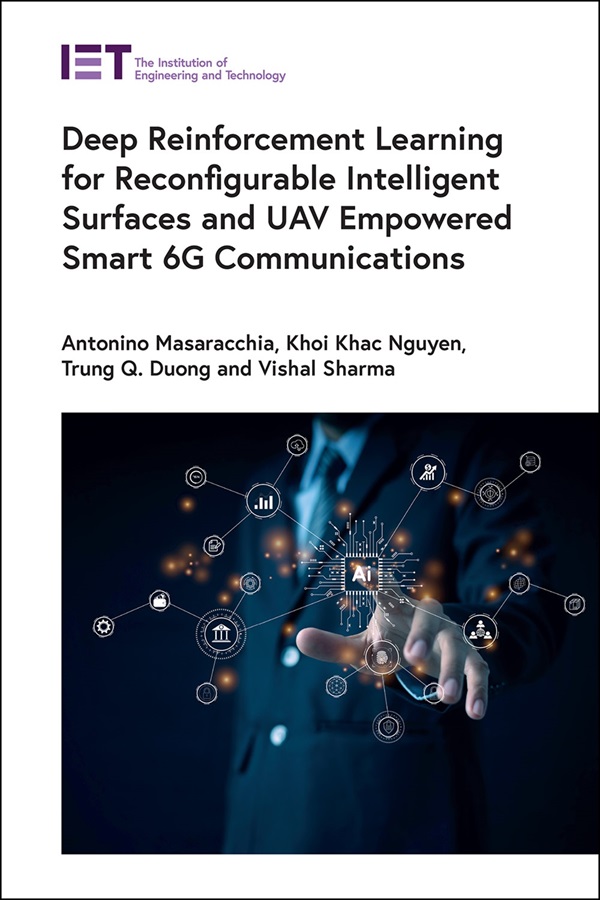- Agricultural Engineering and Technology
- Applied Physics
- Built Environment
- Computing and Networks
- Control, Robotics and Sensors
- Electrical Regulations
- Electromagnetics and Radar
- Energy Engineering
- Healthcare Technologies
- History and Management of Technology
- IET Codes and Guidance
- Manufacturing
- Materials, Circuits and Devices
- Model Forms
- Security
- Telecommunications
- Transportation

Deep Reinforcement Learning for Reconfigurable Intelligent Surfaces and UAV Empowered Smart 6G Communications
by Antonino Masaracchia, Khoi Khac Nguyen, Trung Q. Duong, Vishal Sharma
Reconfigurable intelligent surface (RIS) has emerged as a cutting-edge technology for beyond 5G and 6G networks due to its low-cost hardware production, nearly passive nature, easy deployment, communication without new waves, and energy-saving benefits. Unmanned aerial vehicle (UAV)-assisted wireless networks significantly enhance network coverage.
Resource allocation and real-time decision-making optimisation play a pivotal role in approaching the optimal performance in UAV- and RIS-aided wireless communications. But the existing contributions typically assume having a static environment and often ignore the stringent flight time constraints in real-life applications. It is crucial to improve the decision-making time for meeting the stringent requirements of UAV-assisted wireless networks. Deep reinforcement learning (DRL), which is a combination of reinforcement learning and neural networks, is used to maximise network performance, reduce power consumption, and improve the processing time for real-time applications. DRL algorithms can help UAVs and RIS work fully autonomously, reduce energy consumption and operate optimally in an unexpected environment.
This co-authored book explores the many challenges arising from real-time and autonomous decision-making for 6G. The goal is to provide readers with comprehensive insights into the models and techniques of deep reinforcement learning and its applications in 6G networks and internet-of-things with the support of UAVs and RIS.
Deep Reinforcement Learning for Reconfigurable Intelligent Surfaces and UAV Empowered Smart 6G Communications is aimed at a wide audience of researchers, practitioners, scientists, professors and advanced students in engineering, computer science, information technology, and communication engineering, and networking and ubiquitous computing professionals.
About the Author
Antonino Masaracchia is a Lecturer at Queen Mary University of London. Previously, he was a research fellow at the Centre for Wireless Innovation at Queen's University Belfast, UK. His research activities are focused on optimal resource allocation for enabling URLLCs services in future 5G and 6G networks, and the investigation of innovative real-time optimisation systems for future wireless networks with digital twins. His research interests include digital twins, URLLCs, UAV communications, real-time optimisation, and AI and ML techniques for wireless communication networks. He has authored or co-authored 50+books, book chapters, journals, and conference papers. He has been awarded with the seal of excellence for the project proposal UAV-SURE and UAV-DRESS submitted under the Horizon 2020 s Marie Sklodowska-Curie actions call H2020-MSCA-IF-2020 (September 2020), and Horizon Europe Marie Skodowska-Curie Actions call HORIZON-MSCA-2021-PF-01-01 MSCA Postdoctoral Fellowships (October 2021), respectively.
Khoi Khac Nguyen completed his PhD degree with the School of Electronics, Electrical Engineering and Computer Science, Queen's University Belfast, UK. His research interests include machine learning and deep reinforcement learning for real-time optimisation in wireless networks, reconfigurable intelligent surfaces, unmanned air vehicle (UAV) communication, and massive Internet of Things (IoTs).
Trung Q. Duong is a Canada Excellence Research Chair (CERC) and full professor at Memorial University, Canada. He is also an adjunct chair professor in telecommunications at Queen's University Belfast, UK and a research chair of the Royal Academy of Engineering. His research interests include machine learning, real-time optimisation, data analytics, and 5G-6G networks. He has authored or co-authored 500+ books, book chapters, journals, and conference papers. He is a recipient of the prestigious Royal Academy of Engineering Research Fellowship (2016-20) and won the Newton Prize in 2017.
Vishal Sharma is a senior lecturer in the School of Electronics, Electrical Engineering and Computer Science (EEECS) at Queen's University Belfast (QUB), Northern Ireland, UK. At QUB, he focuses on cyber defence and security and leads research on drone security, digital twins (DT), and blockchain systems. Since 2022, he has been affiliated with the Global Innovation Institute as a fellow and works with the Centre for Secure Information Technologies (CSIT) and the Centre for Intelligent Sustainable Computing (CISC). He is the director of the Innovation-by-design lab at QUB. He leads the British Computer Society (BCS) Accreditation for QUB and is the chair of the Computer Science Programme Review Working Group. He is the co-investigator for the Northern Ireland Advanced Research and Engineering Centre (ARC). He has authored/co-authored more than 140 journal/conference articles and book chapters, co-edited four books and won seven best paper awards. He has served on the editorial board of IEEE Communications Magazine and as section editor-in-chief of Drones journal. Currently, he serves as associate editor of CAAI Transactions on Intelligence Technology, IET Networks, and ICT Express. He is also the co-chair of the IEEE UK and Ireland Diversity, Equity, and Inclusion Committee. He is a senior member of IEEE and a professional member of ACM. He received his PhD degree in Computer Science and Engineering from Thapar University, India.
Publication Year: 2024
Pages: 293
ISBN-13: 978-1-83953-641-0
Format: HBK
